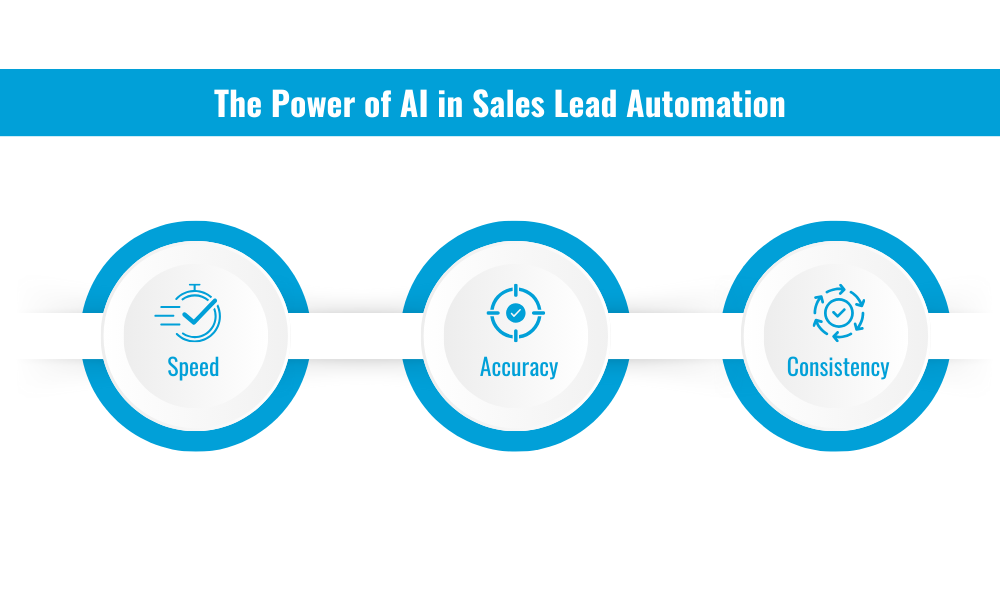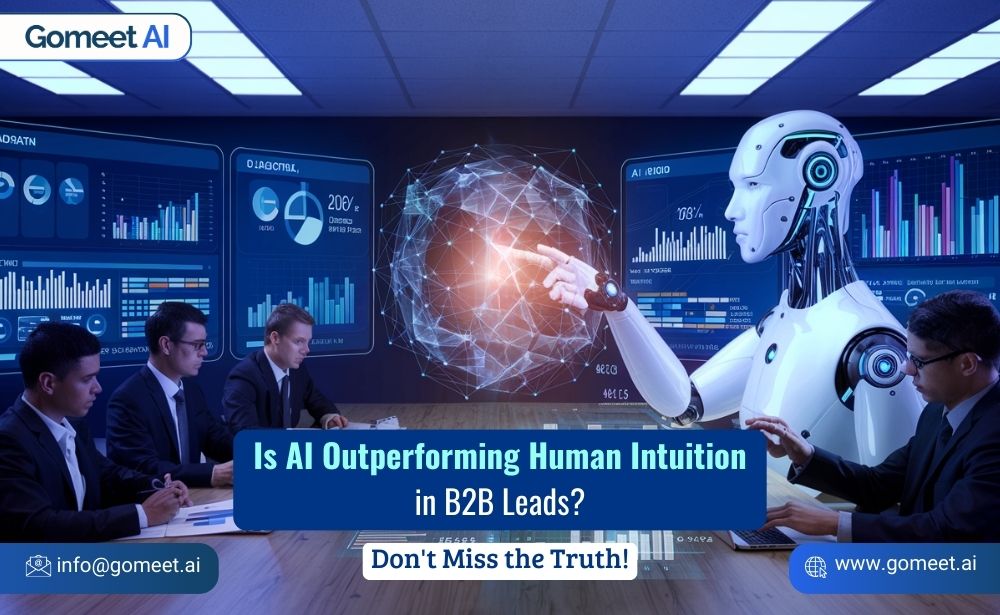In a B2B sales scenario, lead qualification has always been the cornerstone of successful business growth. Traditionally, sales reps have relied on human intuition, personal experience, and gut instinct to assess leads and predict which prospects are worth pursuing. However, with the rise of AI B2B lead software and sales lead automation, a growing debate has emerged: Can artificial intelligence truly outperform human intuition in identifying the best leads?
This debate has sparked curiosity across industries as businesses strive to optimize their sales processes and achieve faster, more accurate results. Is it better to stick with the empathetic, relationship-driven approach of human sales reps, or should companies embrace the precision and speed of AI tools to automate lead qualification?
Let’s delve deeper into this debate, exploring the strengths and weaknesses of both human intuition and AI, while examining how businesses can leverage both to enhance their lead qualification strategies.
1. The Role of Human Intuition in Lead Qualification
For years, human intuition has been the driving force behind sales. Sales reps, often relying on experience, emotional intelligence, and instinct, develop an ability to “sense” which leads are most likely to convert. The advantage of human intuition is its flexibility—salespeople can quickly adapt to changes in conversation, adjust strategies based on subtle cues, and build relationships that AI may struggle to replicate.
Salesforce research indicates that 79% of buyers prefer personalized interactions with salespeople, which is where human intuition shines. Empathy, listening skills, and adaptability allow sales reps to forge personal connections that lead to trust—often the deciding factor in converting a lead. These interactions can be crucial, especially for complex B2B transactions, where decision-making cycles can be long and involve multiple stakeholders.
However, human intuition comes with limitations. It’s subjective, often biased, and can be inconsistent across sales teams. Sales reps might overlook data or misjudge a lead based on personal biases, which can result in missed opportunities. Studies have shown that 88% of missed sales opportunities are due to a lack of proper lead qualification processes.
While human intuition plays an important role, it’s clear that relying solely on it can leave businesses vulnerable to inconsistencies and inefficiencies.
2. The Power of AI in Sales Lead Automation
Enter AI-powered sales lead automation—a game-changer in the B2B space. AI B2B lead software is designed to do what humans cannot: rapidly process and analyze large volumes of data in real-time, generating actionable insights that inform lead scoring, segmentation, and qualification decisions. AI can remove human error and bias by using objective, data-driven criteria to evaluate which leads are most likely to convert.
According to Gartner, companies that use AI for lead qualification and sales automation see a 30% improvement in lead conversion rates compared to those relying on traditional methods. Additionally, Forrester found that businesses adopting AI tools experienced a 15% reduction in sales cycle time—a clear indicator that AI-driven automation can significantly enhance sales efficiency.
The core benefits of AI in lead qualification include:
- Speed: AI processes data exponentially faster than humans, analyzing thousands of leads in seconds.
- Accuracy: AI uses real-time behavioral data, historical performance metrics, and predictive analytics to rank leads based on their likelihood to convert.
- Consistency: AI tools apply the same standards across all leads, eliminating the variability that human biases introduce.

One major advantage of AI sales lead automation is its ability to nurture leads without human intervention. AI-driven systems can send personalized emails, manage follow-ups, and analyze lead responses, allowing sales teams to engage with leads at precisely the right moment.
Example: A SaaS company using AI lead qualification tools saw a 35% increase in productivity within six months. By automating lead scoring and follow-ups, they redirected their sales reps’ efforts toward high-value leads, reducing time spent on unqualified prospects and boosting overall sales performance.
3. AI Scheduling Software: Automating Follow-Ups and Meetings
The process of scheduling meetings and follow-ups can consume a significant portion of a sales rep’s time, particularly in B2B sales, where multiple stakeholders may be involved. Here, AI scheduling software comes into play, offering solutions that drastically reduce the time spent coordinating meetings.
AI scheduling tools such as Gomeet AI, X.ai, and Clara use algorithms to schedule meetings based on the availability of both parties, send reminders, and even handle cancellations or rescheduling without any human involvement. This not only ensures efficient use of a sales team’s time but also improves lead response times.
A HubSpot study found that businesses using AI scheduling software reduced the time to schedule meetings by 67% and saw a 20% increase in scheduled appointments, as these tools reduce friction and delay in the follow-up process.
How Can AI Scheduling Software Transform Your Sales Efficiency?
4. Human Intuition vs. AI: Strengths and Weaknesses
As we compare human intuition and AI, it becomes clear that each has distinct strengths and weaknesses. The table below highlights these differences:
| Human Intuition | AI in Lead Qualification |
| Flexible and adaptable | Data-driven and precise |
| Builds emotional connections | Removes human bias |
| Ideal for complex negotiations | Analyzes vast amounts of data quickly |
| Prone to biases and inconsistencies | Requires ongoing training and fine-tuning |
Human intuition remains valuable in situations that require relationship-building, complex negotiations, and a deep understanding of client needs. For example, in industries with long sales cycles and high-value transactions, human interaction and trust are irreplaceable.
However, AI excels in its ability to process data faster and more consistently. It can quickly spot patterns in customer behavior that humans might miss, leading to more accurate lead scoring and qualification. In addition, AI can continuously learn from new data, improving over time, whereas humans may face knowledge gaps or biases.
5. Blending the Best of Both Worlds
The future of B2B sales lies in combining the strengths of human intuition with the precision of AI. A hybrid approach allows sales teams to automate the more tedious aspects of lead qualification while still retaining the personal touch that human reps bring to relationship-building.
According to McKinsey, businesses that adopt a hybrid model of AI and human sales see a 35% increase in sales productivity. By leveraging sales lead automation for tasks like lead scoring and follow-ups, sales teams can free up time to focus on high-value interactions with leads.
Real-world Example: Salesforce successfully implemented a hybrid model that combines AI B2B lead software with their human sales reps. AI handles the heavy lifting of lead scoring, email follow-ups, and scheduling, while the human team focuses on relationship-building and deal negotiations. This approach led to a 25% increase in lead conversions within the first year.
The lesson is clear: blending AI’s precision with human intuition’s empathy and adaptability offers the best of both worlds, creating an efficient yet personalized sales process.
Conclusion
The debate between human intuition and AI in B2B lead qualification may continue, but the future likely lies in leveraging both to optimize sales performance. Human intuition provides the empathy, flexibility, and personal connection that many B2B buyers still crave, while AI B2B lead software and sales lead automation deliver the speed, accuracy, and consistency that modern businesses need to stay competitive.
By combining the strengths of both, businesses can create a dynamic, efficient, and effective sales process that maximizes productivity and enhances lead qualification. As the business landscape evolves, so too must our approach to sales—integrating both human and AI-driven strategies to stay ahead.
In today’s competitive environment, the most successful companies are those that can blend sales lead automation with the human touch, creating a winning formula for B2B lead qualification.

